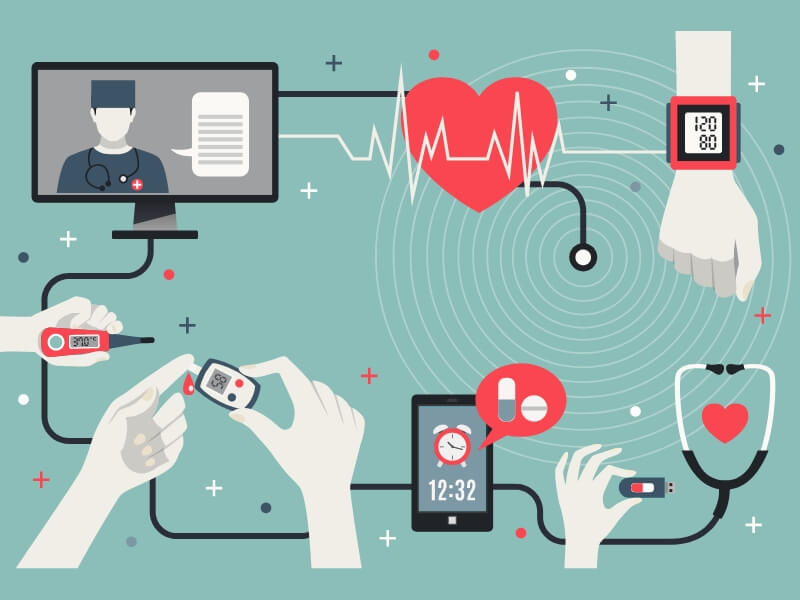Transforming Healthcare Delivery: The Impact of Technological Solutions
“How Technology is Addressing Modern Healthcare Challenges” embarks on a journey through the modern healthcare landscape, uncovering the transformative power of technology in overcoming the complex challenges that define our era.

The essay begins by identifying the pressing challenges faced by healthcare systems globally, such as rising healthcare costs, access disparities, and the demand for personalized care. It then delves into how technology is driving change, starting with telemedicine and remote patient monitoring. These innovations enable healthcare professionals to bridge geographical gaps, extending medical expertise to underserved populations and facilitating ongoing monitoring of chronic conditions.
Moreover, the essay explores the potential of wearable devices, such as smartwatches and fitness trackers, in promoting preventive care and patient empowerment. The data collected from these devices empowers individuals to take control of their health, while healthcare providers gain insights into real-time health trends, enabling early interventions.
“How Technology is Addressing Modern Healthcare Challenges” illustrates how technology is not just a solution but a catalyst for a more accessible, patient-centric, and proactive healthcare ecosystem.
Data-Driven Decision-Making: Revolutionizing Healthcare Management
The narrative of “How Technology is Addressing Modern Healthcare Challenges” continues by delving into the power of data-driven decision-making. In a world inundated with information, technology emerges as the beacon guiding healthcare management toward informed choices and optimized outcomes.
The essay examines the role of Electronic Health Records (EHRs) and their capacity to centralize patient information. This digitized repository allows healthcare providers to make holistic, data-backed decisions, enhancing the quality of care while minimizing errors in treatment.
Furthermore, the essay navigates through the realm of predictive analytics, where sophisticated algorithms leverage historical and real-time data to forecast disease trends, resource allocation, and patient needs. This foresight equips healthcare institutions to allocate resources effectively, streamline operations, and deliver personalized interventions.
The essay illuminates how technology’s mastery over data is revolutionizing healthcare management, ushering in an era of precision and evidence-based decision-making.
Enhancing Patient Outcomes: The Fusion of Technology and Personalized Care
“Empowering Patient Outcomes: The Fusion of Technology and Personalized Care” takes us on a captivating exploration of how technology is redefining the patient experience, focusing on individual needs and holistic well-being.
The essay begins by addressing the challenge of delivering personalized care in a system overwhelmed by patient volumes. It unveils the potential of artificial intelligence (AI) in tailoring treatment plans, utilizing data to recommend interventions that align with each patient’s unique medical history and genetic makeup.
Furthermore, the essay spotlights the concept of telehealth and virtual healthcare, where patients can receive expert medical consultations without the need for physical travel. This technology-driven approach not only enhances patient comfort but also facilitates ongoing care management for chronic conditions.
As the essay unfolds, it underscores how technology nurtures patient engagement and empowerment. Patient portals, digital health apps, and remote monitoring devices empower individuals to actively participate in their healthcare journey, fostering a sense of ownership and accountability.
“How Technology is Addressing Modern Healthcare Challenges” paints a vivid portrait of a healthcare ecosystem where technology not only tackles challenges but also crafts an individualized and patient-centered approach to care.
The Road Ahead: Harnessing Technology for a Healthier Tomorrow
As the final thread of “How Technology is Addressing Modern Healthcare Challenges” is woven, the narrative takes a forward-looking stance, envisioning the potential of technology to shape the future of healthcare.
The essay delves into the promise of artificial intelligence and machine learning in diagnosis and treatment. These technologies have the capacity to analyze vast datasets, assisting healthcare professionals in identifying diseases at an early stage and recommending tailored treatment plans.
Additionally, the essay explores the realm of genomics, where advancements in technology enable researchers to decode the human genome, uncovering personalized insights into an individual’s health risks and potential responses to treatment.
The essay acknowledges the need for responsible technology integration, addressing concerns about data privacy, ethical considerations, and the potential for biases in algorithmic decision-making.
“How Technology is Addressing Modern Healthcare Challenges” is a chronicle of hope and innovation. It reflects a future where technology isn’t just addressing challenges but actively shaping a healthier, more equitable, and patient-centric healthcare landscape.
Empowering Healthcare Professionals: Technology’s Role in Skill Enhancement
The narrative of “How Technology is Addressing Modern Healthcare Challenges” continues by exploring how technology is enhancing the skills and capabilities of healthcare professionals, ultimately leading to improved patient care and outcomes.
The essay delves into the concept of telemedicine platforms, which provide a virtual space for doctors, nurses, and specialists to collaborate and consult on complex cases. These platforms transcend geographical barriers, enabling experts from around the world to contribute their insights, leading to more accurate diagnoses and innovative treatment approaches.
Furthermore, the essay shines a light on simulation technology, a powerful tool for training healthcare professionals. Virtual reality (VR) and augmented reality (AR) simulations offer a risk-free environment for medical students and practitioners to practice surgical procedures, hone diagnostic skills, and prepare for critical situations.
Additionally, the essay explores the integration of artificial intelligence in medical imaging interpretation. Radiologists and other specialists can leverage AI algorithms to detect minute anomalies in medical images, enhancing diagnostic accuracy and expediting patient care.
As the essay unfolds, it underscores the need for continuous professional development in the ever-evolving landscape of healthcare technology. Conferences, workshops, and online courses empower healthcare professionals to stay abreast of technological advancements, ensuring their skills remain aligned with the dynamic healthcare environment.
“How Technology is Addressing Modern Healthcare Challenges” unveils how technology serves as a dynamic partner in healthcare professional development, fostering a generation of skilled and empowered caregivers.

Breaking Down Barriers: Technology’s Role in Healthcare Access
The journey through “How Technology is Addressing Modern Healthcare Challenges” takes a turn toward accessibility, addressing how technology is breaking down barriers and ensuring that quality healthcare reaches every corner of the globe.
The essay begins by acknowledging the access disparities that exist in healthcare, particularly in rural and underserved areas. It then navigates through the transformative potential of mobile health (mHealth) applications. These apps offer a wide range of services, from telemedicine consultations to health education and appointment scheduling, bringing healthcare within reach of individuals who previously faced geographical and logistical barriers.
Moreover, the essay explores the concept of remote patient monitoring, where wearable devices and sensors collect real-time health data and transmit it to healthcare providers. This technology is particularly crucial for chronic disease management, allowing physicians to monitor patients’ conditions remotely and intervene when necessary, thus reducing hospitalizations and improving patient outcomes.
The narrative further delves into the global impact of telemedicine, where telehealth initiatives have provided medical expertise to remote communities and even disaster-stricken areas. The essay showcases how technology enables medical professionals to collaborate across borders, offering guidance and support to regions in need.
“How Technology is Addressing Modern Healthcare Challenges” paints a picture of a future where technology is an equalizing force, ensuring that quality healthcare is not a privilege but a fundamental human right.
Ethics and Accountability: Navigating the Complexities of Healthcare Technology
As “How Technology is Addressing Modern Healthcare Challenges” approaches its conclusion, the narrative takes a reflective pause, delving into the ethical considerations that accompany the integration of technology in healthcare.
The essay acknowledges the ethical dilemmas that arise with the use of artificial intelligence, particularly in decision-making processes. It examines concerns about transparency, accountability, and the potential for bias in algorithms that guide diagnoses and treatment recommendations.
Moreover, the essay delves into data privacy and security, emphasizing the importance of safeguarding patients’ sensitive information in a digital age. Striking a balance between data utilization and privacy protection is an ongoing challenge that healthcare institutions and technology providers must address.
The narrative further explores the need for regulatory frameworks that govern the use of healthcare technology. Regulatory bodies play a crucial role in ensuring that innovations are safe, effective, and adhere to ethical standards.
In conclusion, “How Technology is Addressing Modern Healthcare Challenges” underscores that while technology offers incredible potential, it must be guided by principles of ethics, transparency, and accountability. A collaborative effort between healthcare professionals, policymakers, technologists, and patients is essential to navigate the complexities of healthcare technology in a responsible and morally sound manner.
